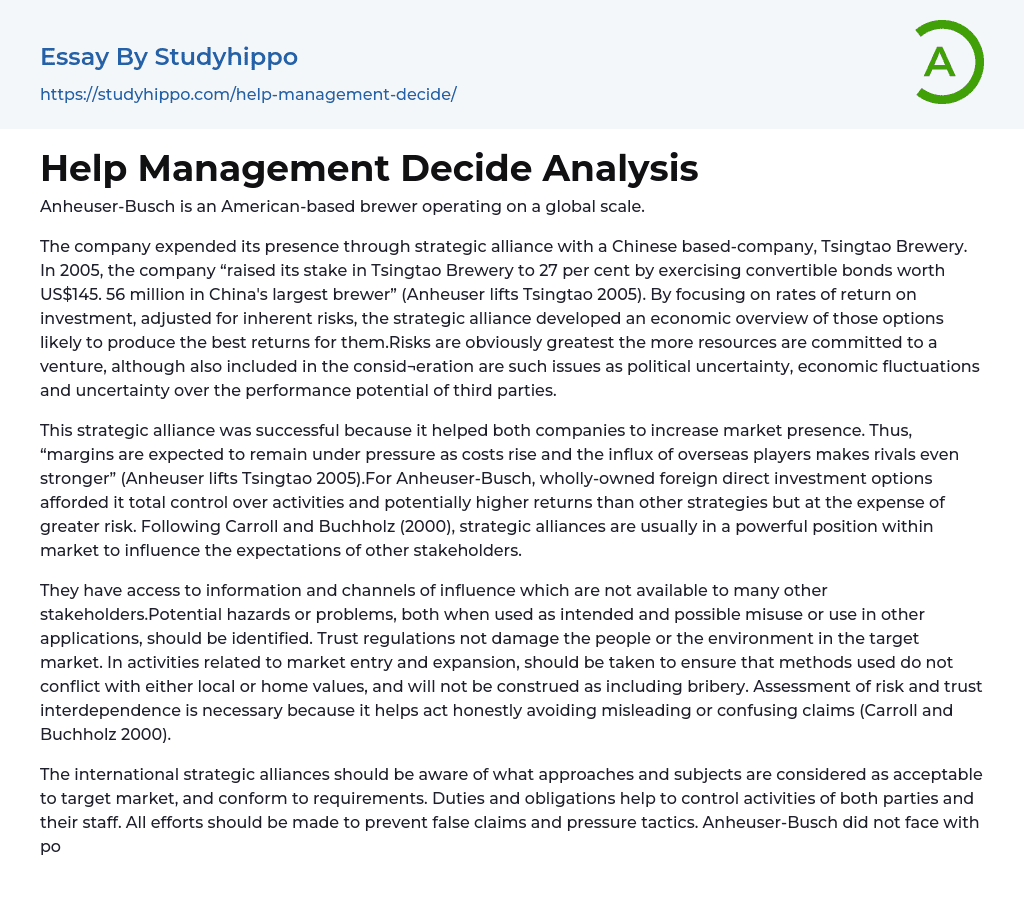Anheuser-Busch, a brewery that originated in the United States, operates globally.
Through a strategic alliance with Tsingtao Brewery, a Chinese-based company, the company enlarged its presence. In 2005, the company increased its stake in Tsingtao Brewery to 27% by employing convertible bonds valued at US$145.56 million in China's leading brewer (Anheuser lifts Tsingtao 2005). The strategic alliance focused on determining the best returns by considering risk-adjusted rates of return on investment. Risks increase with more committed resources in a venture. Other factors such as political instability, economic fluctuations, and uncertainty over the performance potential of third parties were also considered.
The strategic alliance proved to be successful in boosting the market presence of both companies. As a result, margins are predicted to experience pressure due to rising costs and competition from international players, according to Anheuse
...r lifts Tsingtao 2005. Anheuser-Busch had control over its operations through wholly-owned foreign direct investment, which offered higher returns but posed greater risks. Strategic alliances, according to Carroll and Buchholz (2000), typically give a position of influence to companies within the market that can affect the expectations of other stakeholders.
Access to information and influential channels is exclusive to some stakeholders. It is essential to identify potential hazards or issues that may arise from intended or unintended use of products. Regulations should prioritize the protection of people and the environment so as not to cause harm in the target market. Activities involved in market expansion need to consider local and ethical values and avoid any bribery attempts. Honest actions and avoidance of misleading claims rely on assessing risks and interdependence of trust (Carroll and Buchholz 2000).
When forming international strategi
alliances, it is important to consider appropriate approaches and topics for the target market and adhere to requirements. Duties and obligations help regulate activities of both parties and personnel to prevent misleading claims or undue pressure. Anheuser-Busch had no political or legal issues in China due to a favorable legal structure that offers ample opportunities for multinational corporations. However, intense competition posed a significant challenge.
Anheuser-Busch has faced difficulties due to rising energy and raw material expenses, yet its national brand identity has proven advantageous in China. By satisfying various consumer demands and fostering customer allegiance, the corporation has broadened its merchandise selection and formed a formidable presence within the Chinese industry. (Source: Anheuser lifts Tsingtao 2005).
- Advertisement essays
- Advertising essays
- Anheuser-busch essays
- Audience Theory essays
- Brand essays
- Brands essays
- Competitor Analysis essays
- Consumer essays
- Detergent essays
- Marketing Management essays
- Marketing Mix essays
- Marketing Plan essays
- Marketing Research essays
- Marketing Strategy essays
- New Product Development essays
- Point Of Sale essays
- Price essays
- Procurement essays
- Product essays
- Product Differentiation essays
- Product Placement essays
- Promotion essays
- Promotion And Marketing Communications essays
- Research Design essays
- Retailing essays
- Trademark essays
- Board Of Directors essays
- Brand Management essays
- Business Ethics essays
- Business Management essays
- Change Management essays
- Comparative Analysis essays
- Decision Making essays
- Dispute Resolution essays
- Knowledge Management essays
- Leadership essays
- Leadership and Management essays
- Manager essays
- Operations Management essays
- Performance Management essays
- Product Management essays
- Project Management essays
- Quality Management essays
- Risk essays
- Risk Management essays
- Scientific Management essays
- Stress Management essays
- supply chain management essays
- Time Management essays
- Total Quality Management essays




